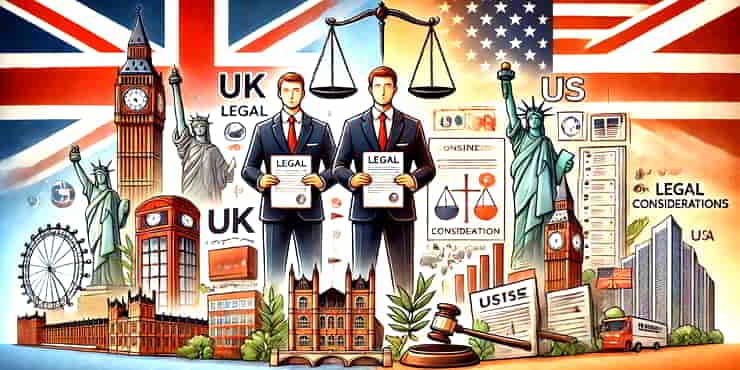Legal Basics for Solopreneurs: What to Know First

Estimated reading time: 6 Min
Don’t get caught out. Learn the key legal considerations for running a solo business—contracts, compliance, and protecting your work.
Running your own business can be thrilling, but it comes with its own set of compliance responsibilities that serve to protect you, your business and others.
A quick heads-up: I am not a legal advisor and recommend you reach out to locally based advisors.
There is a list of some resources at the end of this post.
Here I introduce requirements for the UK and US.
Whether you’re in the UK, the US, or anywhere else, being well-versed in legal matters not only safeguards your business but also sets a solid foundation for growth.
This guide cannot be taken as direct advice for your business, but it will walk you through the essentials of legal requirements for any business, ensuring you stay informed and protected.
It is best to conduct local research and, if necessary, consult a local lawyer for advice.
Choosing the Appropriate Business Structure
When starting out, one of the first decisions you’ll face is selecting the right business structure.
The main options differ slightly between the UK and the US but include sole proprietorships (sole traders), partnerships, limited companies (LLCs in the US), and corporations.
- Sole Trader / Sole Proprietorship
This is the simplest form, where you and your business are one entity. It’s easy to set up, but it offers no personal liability protection. - Partnership (UK) / General Partnership (US)
Similar to a sole trader but involves two or more people running a business together. Partners share profits and liabilities. - Limited Company (UK) / LLC (US)
These provide limited liability protection, meaning your personal assets are protected if your business faces legal issues. - Corporations (both UK and US)
This is a more complex structure, offering significant liability protection and the ability to raise capital through stock. However, it requires more compliance and regulatory paperwork.
Choosing the right structure depends on your business needs, risk tolerance, and growth plans.
Consulting with a legal advisor can help you make an informed decision.
Intellectual Property Rights: Securing Your Ideas and Brand
Protecting your ideas and brand is essential for maintaining a competitive edge.
Intellectual property (IP) rights in both the UK and the US include trademarks, copyrights, and patents.
- Trademarks
These protect your brand name, logo, and other identifiers that distinguish your business. Registering a trademark helps prevent others from using similar marks that could confuse customers. In the UK, this is done through the Intellectual Property Office (IPO); in the US, it’s through the United States Patent and Trademark Office (USPTO). - Copyrights
These safeguard original works such as articles, music, and software. It’s automatically granted upon creation, but registering it provides stronger protection. In the US, registration is done through the US Copyright Office. - Patents
Patents protect inventions and processes, preventing others from making, using, or selling your innovation without permission. The application process is rigorous and requires a detailed description of your invention.
Securing your intellectual property involves understanding these rights and taking steps to register and enforce them.
This not only protects your creations but also adds value to your business.
Consulting with a specialist legal advisor is important to help you make good decisions.
Contracts and Agreements: Your Business’ Safety Nets
Both within your business and with third parties, contracts are vital in defining the terms of your business relationships and ensuring all parties are on the same page.
- Drafting Enforceable Agreements
Clear, concise, and thorough contracts help prevent misunderstandings and disputes. It’s wise to include details on deliverables, payment terms, and confidentiality clauses. - Navigating Collaborations and Partnerships
When collaborating with others, a well-drafted agreement outlines the roles, responsibilities, and expectations of each party. This helps in maintaining healthy business relationships and avoiding conflicts.
Contracts serve as your business’s safety net, offering legal protection and clarity in your dealings.
Understanding Taxes and Financial Regulations
Tax obligations can be daunting, but staying compliant is essential for avoiding penalties.
Both the UK and the US have specific tax responsibilities for solopreneurs.
- UK Tax Obligations
As a solopreneur, you’ll need to manage self-assessment tax returns, National Insurance contributions, and potentially VAT. Understanding your tax responsibilities helps with effective financial planning. - US Tax Obligations
You’ll need to manage self-employment taxes, income taxes, and potentially sales taxes. Understanding your tax responsibilities helps with effective financial planning. - Financial Regulations and Compliance
Keeping accurate records and staying updated with financial regulations is a vital discipline. Proper documentation can mitigate audit risks and ensure smooth business operations.
Regularly consulting with a tax professional can help you handle these complexities and stay on top of your financial obligations.
Navigating Online Business Laws
Operating online opens up a new set of legal considerations, particularly around privacy and e-commerce.
- Complying with Online Privacy Laws
Protecting customer data is paramount. Ensure your website has a clear privacy policy and complies with regulations like GDPR in the UK and EU, CCPA in the US, or any local requirements. - E-commerce Regulations
Understanding rules around online sales, such as consumer rights and product liability, is essential. This helps in maintaining trust and legality in your online operations. - Digital Marketing Legalities
Ensure your marketing practices comply with laws regarding email marketing, social media, and advertising to avoid legal pitfalls.
Adhering to evolving online business laws helps in building a reputable and legally sound digital presence.
Basic Insurance Considerations
Insurance is a critical consideration for protecting your business against unforeseen events.
Here are the most important types of insurance for businesses in both the UK and the US:
- Third-Party Liability Insurance
This covers you if someone is injured or their property is damaged because of your business activities. It’s especially important if you have clients visiting your premises or if you work on client sites. - General Business Insurance
This provides broader coverage, including property damage, legal liabilities, and employee-related risks. It can protect your business from a variety of claims, including bodily injury, property damage, personal injury, and more. - Professional Indemnity Insurance
Also known as errors and omissions insurance, this covers legal costs and damages if you’re sued for negligent services or advice that caused a client to lose money. - Product Liability Insurance
If your business manufactures or sells products, this insurance protects against claims of injury or damage caused by those products. - Employer’s Liability Insurance (UK)
If you employ staff, this insurance is mandatory in the UK. It covers claims made by employees for injuries or illnesses caused by their work. - Worker’s Compensation Insurance (US)
Similar to employer’s liability insurance, this covers medical expenses and a portion of lost wages for employees who become injured or ill at work.
Ensuring you have the right insurance policies in place can provide peace of mind and financial protection against potential risks.
FAQs: Legal Considerations For Business
Do I need a lawyer to start my business?
While it’s not mandatory, consulting with a lawyer can help you navigate complex legal matters and set up your business correctly from the start.
How can I protect my business name?
Registering a trademark for your business name provides legal protection and prevents others from using a similar name.
What should I include in a business contract?
Key elements include the scope of work, payment terms, deadlines, confidentiality clauses, and dispute resolution mechanisms.
How often should I review my legal documents?
Regular reviews, at least annually or when significant changes occur, ensure your documents remain current and compliant.
Where can I find reliable legal resources?
Online legal services, government websites, and professional legal advisors are good starting points for reliable information.
Summary
Legal knowledge is a cornerstone of successful solo business ownership.
By choosing the right business structure, securing your intellectual property, drafting solid contracts, understanding tax obligations, and complying with online laws, you protect your business from potential legal issues.
Proactive, locally advised legal planning not only shields your venture but also paves the way for sustainable growth.
Please take action on this.
You may not need to implement everything right away but you do need to plan to take action when it’s necessary!
😉
Richard
Useful Resources
UK Resources:
- UK Government: Business and Self-Employed
- Intellectual Property Office
- Companies House
- HM Revenue & Customs
- Law Society
US Resources:
- U.S. Small Business Administration
- Intellectual Property Office
- LegalZoom
- Nolo
- HM Revenue & Customs
By staying informed and proactive, you can effectively protect your business and focus on what you do best: growing your venture.


![Are Wealthy Affiliate Hubs Revolutionising Website & Content Development In [year]? A futuristic and sleek digital workspace designed for website management and content creation - Wealthy Affiliate Hubs](https://ml0yvzumdtic.i.optimole.com/cb:k6B_.1fa14/w:740/h:370/q:mauto/https://solobusinessmind.com/wp-content/uploads/2024/12/A-futuristic-and-sleek-digital-workspace-designed-for-website-management-and-content-creation-Wealthy-Affiliate-Hubs740x370-O.jpg)



